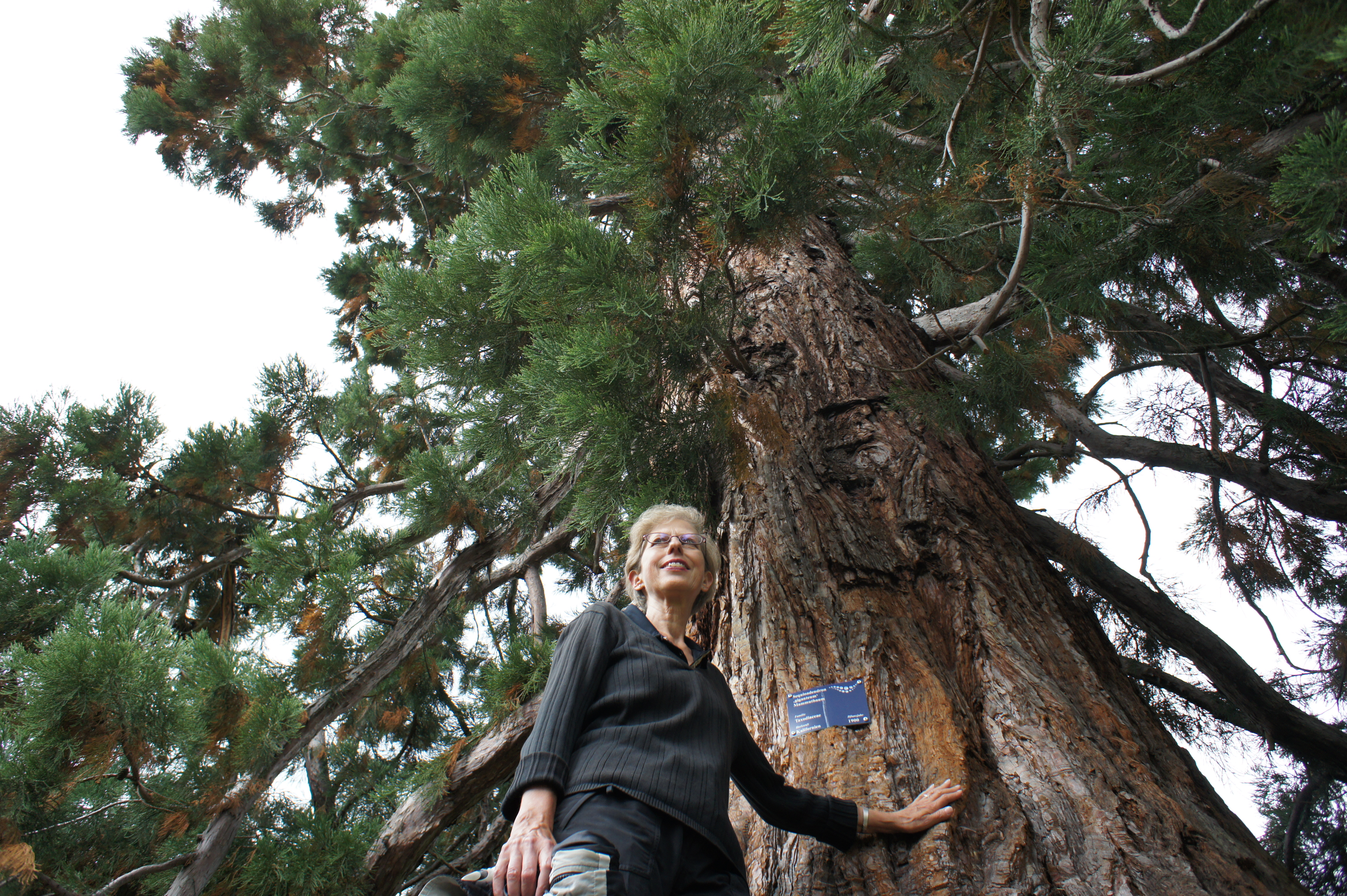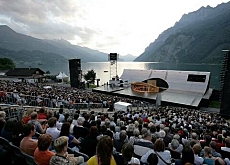“Power” trails add value to rural region

The tourist region dubbed Heidiland has just opened a series of trails to esoteric hot spots that are also designed to boost the region’s economic competitiveness.
The 15 signposted routes criss-cross the eastern region. They take walkers to natural and cultural sites where there is said to be an abundance of positive energy.
Throughout the summer, the media – including swissinfo.ch – was given a sneak preview of the trails and the pseudoscience behind the claim by life-force believers that these paths lead to places where positive energy literally flows out of the ground.
“It depends how well you perceive,” says Andrea Fischbacher, a life-force researcher.
Fischbacher speaks as she directs members of a group to step up, one by one, onto a wooden platform inside the picturesque St George chapel on a promontory high above the village of Flums.
One can tap into the positive energy on this exact spot, she explains, even if some members were sceptical, failing to notice any immediate benefits.
“There are people who feel nothing because they are not sensitive to these very subtle earth vibrations, but they still absorb the energy. Myself, I feel pins and needles in my whole body,” Fischbacher claims.
But whether one is a life-force believer or not, it was calculated economic reasoning that led to the creation of the trails.
In 2008, the federal authorities introduced a New Regional Policy (NRP), essentially a federal funding programme aimed at helping peripheral regions to help themselves.
Competitive edge
According to the Organisation for Economic Co-operation and Development (OECD), Switzerland’s NRP “reflects a clear shift away from financial assistance and towards supporting regions’ own competitive edge and value added”.
This policy is based on the awareness that even in one of the world’s richest nations, wealth is not distributed equally.
In a nutshell, peripheral regions – essentially all of Switzerland outside its urban agglomerations centred on the largest cities – can ask for federal funding for innovative projects that enhance economic competitiveness.
The canton of St Gallen, of which Heidiland is a part, received SFr1.6 million ($2.03 million) over five years for its “Alpine Wellness” project, which includes the Places of Power trails.
The unique focus of these walks helps set Heidiland apart from its very similar competitors across Switzerland that also boast idyllic alpine landscapes but lack large resorts with the kind of infrastructure and capacity to handle mass tourism.
More than Heidi
“There’s much more to discover in Heidiland than just an impressive landscape or the original setting of the Heidi story,” Adrian Pfiffner of Heidiland Tourism told swissinfo.ch.
“There are a lot of secret places which reveal something about earlier times. With the Places of Power offer we want to guide our visitors to these special spots, where they can have unusual experiences.”
Despite Heidiland’s modest infrastructure, tourism is very important for the region and therefore a reason that this sector of the economy is a target for NRP funding.
Björn Caviezel, CEO of Heidiland Tourism, says tourism is the area’s leading economic branch, with seven per cent of the local workforce directly employed in the sector – nearly double the national average.
Before NRP was introduced, the federal government used a subsidies system that often failed to take economic viability into account and was therefore criticised for not providing a stimulus for peripheral regions.
NRP does not use a top-down approach, but is a partnership between the State Secretariat for Economic Affairs (Seco) and cantons.
Eligibility
According to Sebastian Bellwald of Regiosuisse, a body created to support NRP project implementation, Seco enters into contracts with individual cantons. The agreement lays out the parameters for the kind of projects eligible for funding.
These contracts include indicators which enable the cantons to measure success. In the first two years of NRP, SFr140 million was paid out in either loans or non-repayable grants to support the launch of 600 projects.
Bellwald says the lack of know-how at the regional level to implement such a programme and defining ways to evaluate success have been great challenges.
And while the OECD has praise for the NRP, it also says the programme could be improved. The Paris-based body says Switzerland is making a mistake limiting NRP to rural areas.
“Expanding the reach would strengthen the beneficial links between urban and rural areas. It would also prevent competition between urban and rural areas’ priorities and duplication of sectoral projects,” the OECD said in its 2011 report.
Back in Heidiland, the tourism office hopes the funding of the new trails network will at least make believers of local service providers, who should see more money in their tills from the increase of visitors seeking positive energy.
The Swiss federal government’s New Regional Policy, which came into effect at the beginning of 2008, is designed to help rural, mountainous and border areas to implement development programmes:
Adjustment to the globalised economy: Regional policy helps rural areas to adjust to the globalised economy.
Enhance export capacity: Regional policy supports export-oriented value creation systems.
Laws of the market: Regional policy takes account of the laws of the market.
Focus on geographical and functional centres: The regional centres are the development drivers.
(source: Regiosuisse)

In compliance with the JTI standards
More: SWI swissinfo.ch certified by the Journalism Trust Initiative















You can find an overview of ongoing debates with our journalists here . Please join us!
If you want to start a conversation about a topic raised in this article or want to report factual errors, email us at english@swissinfo.ch.